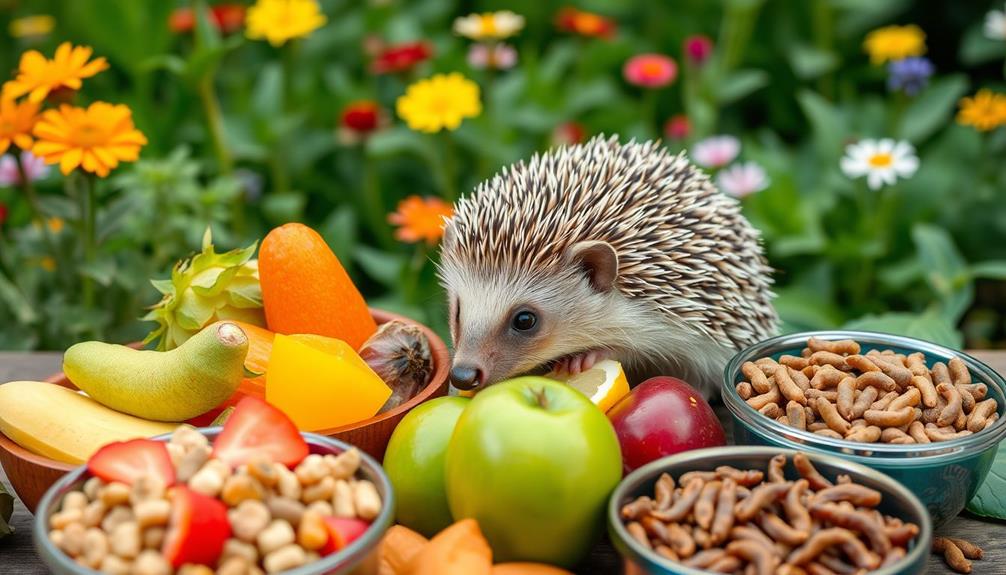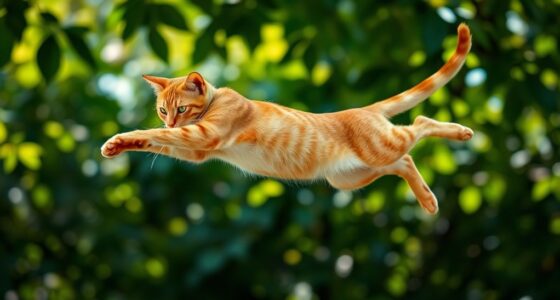The Cat Breed Personality Quiz is your ideal tool for finding the purr-fect feline match! It engages you with fun, insightful questions about your lifestyle, activity levels, and grooming preferences. You'll discover which cat breeds align with your family dynamics, whether you need a playful companion for kids or an independent friend for busy schedules. Plus, the quiz helps you consider important traits like sociability and energy needs, ensuring a harmonious relationship. Take the first step towards your new furry friend and uncover fascinating insights about cat ownership as you explore the quiz further.
Key Takeaways
- The Cat Breed Personality Quiz assesses your lifestyle, activity level, and grooming preferences to suggest suitable cat breeds.
- Discover sociable and playful breed options like Ragdolls or Maine Coons that thrive in family environments.
- Evaluate your daily routine to find a cat breed that matches your energy levels and activity needs.
- The quiz highlights grooming requirements, helping you choose breeds that align with your maintenance capabilities.
- Share your quiz results to connect with other cat enthusiasts and enhance your understanding of feline compatibility.
Understanding Cat Breed Selection
When you're choosing a cat breed, understanding your lifestyle and preferences is key to finding the right match. To start, think about your daily routine and family dynamics. Are you active and outgoing, or more laid-back and quiet?
The Purina Cat Breed Selector can help you assess potential breeds based on factors like activity level and sociability, ensuring you know the cat breeds that fit your life. Additionally, consider how your current pets, such as dogs with specific personality traits, may interact with a new cat. For instance, tough dog names might indicate a strong personality that requires careful introductions to a new feline friend.
Next, consider grooming needs. Some breeds require more maintenance than others, so it's important to choose a cat that matches your willingness to invest time in grooming.
For instance, while Maine Coons are playful and friendly, they also have thick fur that needs regular brushing.
Exploring Behavioral Preferences
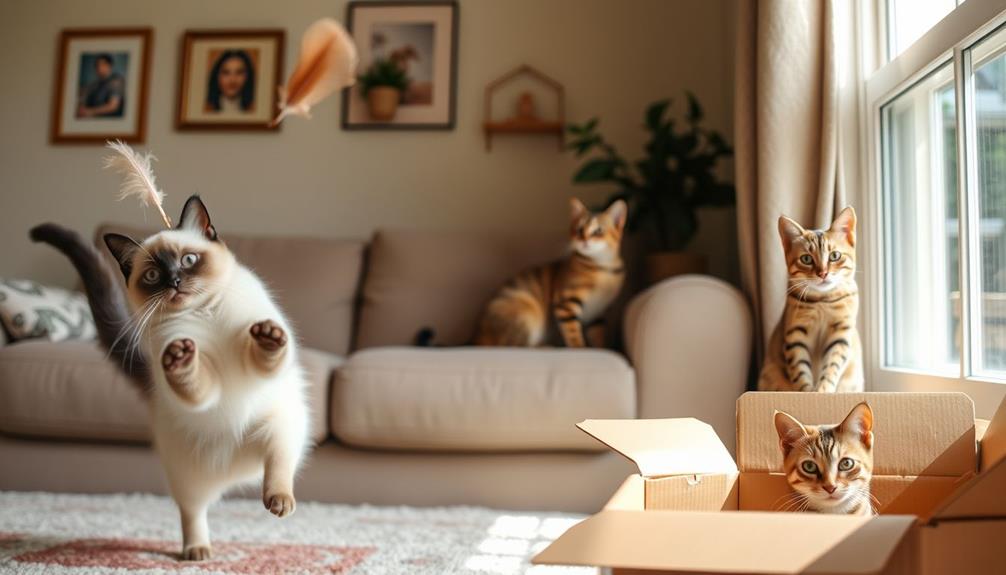
When choosing a cat, consider their activity level, sociability, and talkativeness to find the perfect match for your lifestyle.
Some breeds, like the Persian, prefer a laid-back environment, while others, such as the Bengal, thrive on energy and play.
Research indicates that cats can form emotional attachments similar to dogs, though they express it differently, often through behaviors like purring or rubbing against their owners.
Understanding these behavioral preferences helps guarantee you and your new feline friend enjoy a harmonious life together.
Additionally, take note of how certain environmental factors, such as 10 smells cats hate, can influence your cat's comfort in your home.
Activity Level Preferences
Choosing the right cat breed involves more than just looks; it's about finding a companion that fits your lifestyle, especially regarding activity level preferences.
Different breeds exhibit varying activity levels, from calm and laid-back cats like Persians to highly active, playful types such as Bengals. Understanding these differences is vital for ensuring your cat receives the mental and physical stimulation it needs to thrive.
Additionally, considering your astrological sign may influence your preferences in pet ownership, as astrology shapes personal confidence and self-image, which can extend to how you perceive potential companions.
If you're someone who enjoys a relaxed environment, you might prefer a breed that's less demanding. Calm cats often love lounging and appreciate short bursts of playtime.
On the other hand, if you're looking for a cat that's playful and energetic, a breed with a higher activity level will likely be a better fit. Highly active breeds often require interactive play and ample space to roam, making them ideal for owners who can engage in daily activities with them.
Assessing your lifestyle and energy levels is essential in selecting the right breed.
Whether you want an average build cat that enjoys a cozy evening or a lively companion to play with, matching activity levels is key to a harmonious relationship.
Sociability and Talkativeness
Understanding a cat's sociability and talkativeness can greatly enhance your experience as a pet owner, complementing your insights into activity level preferences. Different breeds exhibit unique traits, from the highly sociable Ragdoll that craves human interaction to the more independent British Shorthair, which enjoys its solitude.
When choosing your perfect feline match, consider how these factors align with your lifestyle. Some cats are friendly but independent, making them ideal for families with busy schedules. Others, like the vocal Siamese, will engage in delightful conversations, while more reserved breeds may prefer quiet companionship.
Here's a quick guide to help you evaluate sociability and talkativeness among popular breeds:
| Breed | Sociability & Talkativeness |
|---|---|
| Ragdoll | Highly sociable, loves interaction |
| British Shorthair | Independent, enjoys solitude |
| Siamese | Very vocal, loves to communicate |
| Maine Coon | Friendly, sociable, and affectionate |
| Scottish Fold | Playful but enjoys personal space |
Physical Traits and Grooming Needs

Exploring the physical traits and grooming needs of different cat breeds can greatly impact your decision when bringing a feline friend into your home. For instance, if you're pondering a cat that's playful, you'll want to reflect on body types and energy levels. Lean breeds like the Abyssinian are often more active, while stockier breeds, like the British Shorthair, might be more laid-back.
It's also important to take into account how the cat's personality may align with its physical traits, as certain breeds are known for their sociability or independence, much like how specialty beans offer unique flavors based on their origin and preparation.
Grooming my cat is another vital factor to contemplate. Some breeds, such as Persians, require daily grooming due to their long fur, while others, like the British Shorthair, need only weekly maintenance.
If you prefer a low-maintenance option, you might want to avoid breeds with dense coats that demand frequent grooming.
Additionally, if you plan to have your cat live indoors, keep in mind that hypoallergenic breeds, like the Siberian, produce fewer allergens, which can be a game-changer for allergy sufferers.
A cat's physical appearance, including coat color and pattern, can also influence your choice, as many people are drawn to specific visual traits that catch their eye.
Environmental Considerations for Cats

When bringing a cat into your home, the environment you provide can considerably affect their well-being and happiness. If you prefer a cat that's slightly more adaptable to indoor life, consider breeds that thrive in limited space, like the British Shorthair. These independent cats often handle solitude well, making them great for busy households.
Additionally, providing opportunities for play is vital, as it enhances their physical development and reduces stress, aligning with the importance of play in enhancing sensory, cognitive, social, and emotional growth.
On the other hand, if you're drawn to energetic breeds like Bengals or Abyssinians, be prepared for a more demanding environment. These cats generally need access to outdoor spaces or ample indoor enrichment to satisfy their high activity levels.
Providing vertical spaces such as cat trees can help fulfill their natural climbing instincts, keeping them stimulated and content.
It's also essential to know which breed fits your lifestyle. For families with young children, sociable breeds like Ragdolls or Maine Coons may be ideal, as they tend to be tolerant and friendly.
Ultimately, your cat's happiness hinges on creating an environment that matches their energy levels and personality traits, ensuring they thrive in your home.
Family Dynamics and Cat Compatibility
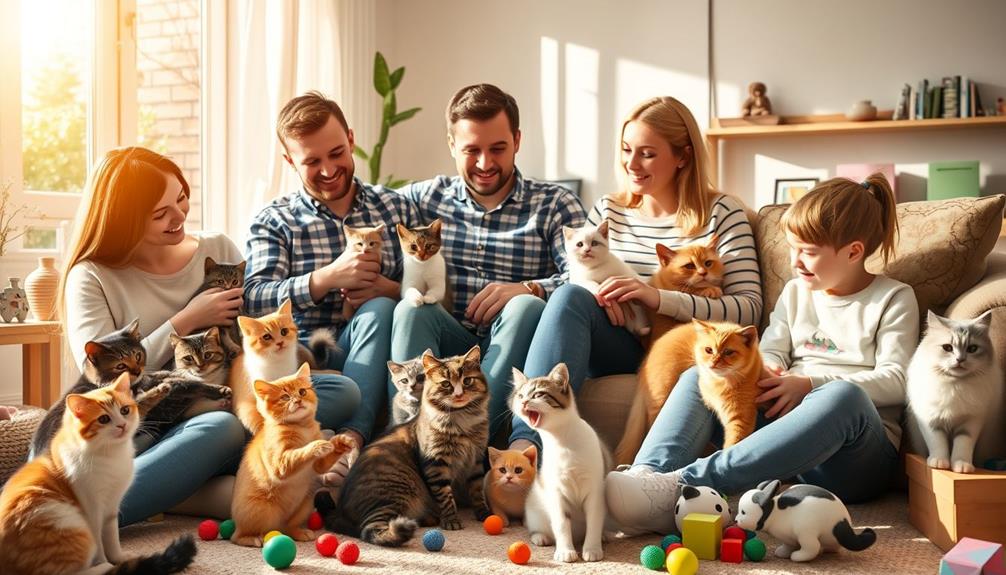
When choosing a cat, you need to think about how your family interacts with pets. Some breeds, like Ragdolls, thrive in active households, while others, like British Shorthairs, prefer a more independent lifestyle.
Understanding your family's dynamics can enhance your pet selection process and guarantee a harmonious environment for everyone.
For instance, reviving old friendships often requires patience and understanding, similar to integrating a new cat into your family. Evaluating your family's dynamics will help you find a cat that fits seamlessly into your home.
Understanding Family Interactions
Choosing the right cat breed for your family involves understanding how different breeds interact with children and the overall family dynamic. Some cat breeds are naturally more sociable and tolerant of young family members, making them ideal for homes with kids.
When pondering a cat that's playful, think about the age of your children, as younger kids often benefit from a breed that enjoys active play. Additionally, it's important to reflect on security aspects of your home environment, as a good home security system can provide peace of mind while introducing a new pet into your family.
Breeds known for their friendly and adaptable personalities tend to thrive in family settings. These cats can handle the hustle and bustle of daily life, providing companionship without feeling overwhelmed.
On the other hand, if your household is quieter, you might prefer a breed that enjoys serenity.
Evaluating your family's lifestyle is essential. If you have active children who love to play, look for breeds that are energetic and enjoy interaction.
Ensuring the compatibility of the breed with children creates a harmonious environment where both pets and family members can coexist happily. By choosing a breed that aligns with your family's dynamics, you'll foster a more enjoyable and stress-free living arrangement for everyone involved.
Breed Compatibility Factors
Understanding breed compatibility factors is vital for guaranteeing a harmonious household. Family dynamics greatly influence how well a cat breed will mesh with your lifestyle and members, especially children. For families with young kids, breeds like Ragdolls or Maine Coons are often ideal due to their sociable and playful nature. They can handle the energy and curiosity of children without feeling overwhelmed.
Additionally, just as it's important to take into account the compatibility of your new feline friend, guaranteeing your home is equipped with features that enhance comfort and safety is fundamental, such as safety glasses for family members engaging in various activities.
It's essential to take into account the energy levels and activity needs of different breeds. A high-energy cat might thrive in a busy household, while a more laid-back breed may suit a quieter environment better. The age of your children also matters; younger kids usually do best with tolerant, easygoing cats, while older children may enjoy the antics of more playful breeds.
Take a moment to assess your family lifestyle and preferences. This will guide you in selecting a breed that fits well within your existing dynamics. By prioritizing breed compatibility, you'll help guarantee a positive experience for both your new feline friend and your family, creating a loving and enjoyable home for everyone involved.
Engaging With the Quiz Experience
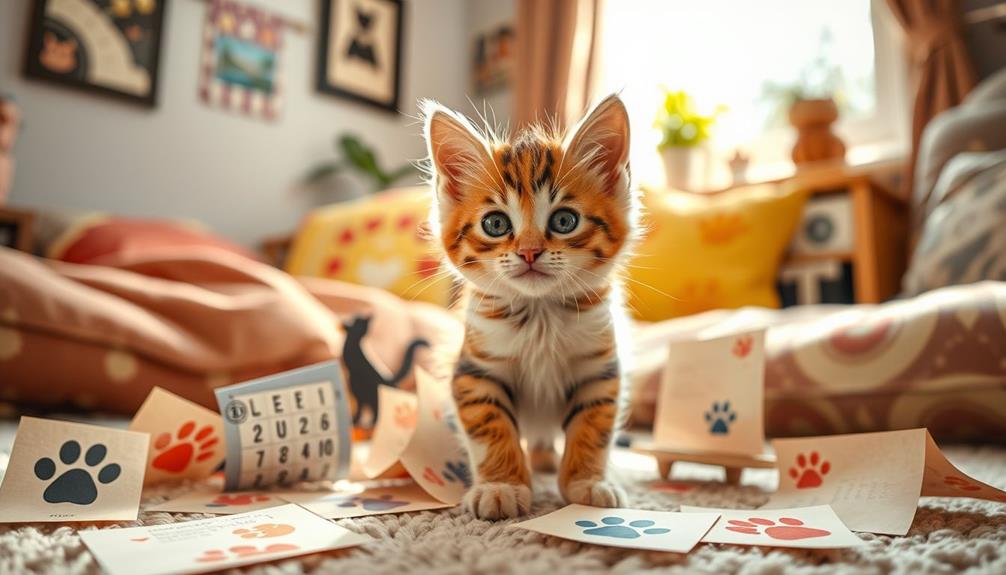
Engaging with the Cat Breed Personality Quiz offers a delightful blend of fun and self-discovery. You'll answer multiple-choice questions that cover everything from your activity level to your grooming commitment. This interactive experience encourages you to reflect on your personality traits and pet ownership attitudes, leading to a perfect cat match.
The quiz not only matches you with a breed that suits your lifestyle but also provides insights into the playful nature of different kittens. You might find yourself surprised at how closely the results align with your expectations. Here's a quick overview of what you can expect from the quiz experience:
| Aspect | Details |
|---|---|
| Activity Level | How active are you? |
| Grooming Commitment | Are you up for regular grooming? |
| Sociability | Do you enjoy a social cat or a more independent one? |
| Playfulness | How much playtime can you offer your feline? |
Once you complete the quiz, don't forget to share your results with friends! This fosters conversations within the cat-loving community and enhances your overall experience.
Frequently Asked Questions
What Cat Breed Has the Nicest Personality?
When it comes to cat breeds with nice personalities, Ragdolls often top the list. Their affectionate nature and love for cuddling make them wonderful companions, but Maine Coons and Scottish Folds are also incredibly friendly.
How Do I Find the Perfect Cat for My Cat?
Finding the perfect cat for your home isn't overwhelming. Start by evaluating your lifestyle, family dynamics, and grooming preferences. This guarantees you choose a cat that fits seamlessly into your life and brings joy.
What Cat Personalities Go Together?
Cat personalities often complement each other based on your lifestyle. Affectionate breeds match well with sociable owners, while independent ones suit low-maintenance lifestyles. Playful cats thrive with active families, and calm breeds fit quieter homes perfectly.
How Do I Figure Out the Breed of My Cat?
Did you know that over 70% of cats in shelters are mixed breeds? To figure out your cat's breed, observe its traits, use online tools, consult experts, or engage with cat communities for insights.
Conclusion
In your journey to find the perfect feline friend, remember that each cat breed brings its own unique personality and traits. Did you know that around 70% of cat owners say their cats have distinct personalities that reflect their human's lifestyle? Imagine sharing your home with a furry companion that mirrors your energy, whether it's a playful ball of fur or a calm cuddle bug. Immerse yourself in the quiz, and discover the purr-fect match for you!

